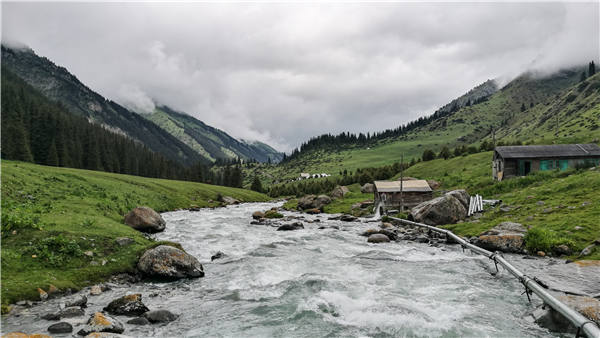

In our time
In Bishkek, the capital of Kyrgyzstan, he met a young woman named Zoey, who ran a restaurant. Zoey told Liu that she did not have a sense of belonging, although she had lived in many different places, including the United States, Saudi Arabia, as well as her mother country, Kyrgyzstan.
Liu told her that he had the same feeling, describing himself as a modern nomad, moving around all the time from one place to another, belonging to nowhere.
"For modern nomads, traveling is not to reach any destination, but for the sake of travel itself. The most important thing is to keep moving," he writes.
In Central Asia, he traveled across the depopulated zone of Pamir in Tajikistan, visited a nuclear test site of the former Soviet Union in Kazakhstan, and strolled through Samarqand, Uzbekistan's second largest city, to see the ancient buildings that carry the former brilliance of the Islamic empire.
At a bar in Uzbekistan, he saw a drunk businessman tossing cash into the air while shouting:"What you saw was fake, and this is reality." In 2019, Liu's essay about his travels in Uzbekistan was shortlisted for a True Story Award, an award founded by Reportagen, a magazine in Switzerland, to choose the best nonfiction writing among competitors from 29 countries and regions.
He also saw the influence of China's development on its neighbors. For instance, in Tajikistan, he met a young man called Xing Yun (in Chinese literally meaning "lucky") who was studying Chinese and keen to talk to Chinese people to practice his Mandarin.
Travel writing is a long-established genre in the West, but still quite new for Chinese readers. The best of its kind are those full of people's stories, Luo says, and Liu's travel writing follows this tradition to record the stories of real people.

Since the reform and opening-up, China attached great importance to studying English and other foreign languages. Writers of Liu's generation, with a firm grasp of English, or other foreign language skills, started traveling the world.
"You would find that there was little writing about individual travel around the world from the perspective of Chinese people, despite the fact that there is a lot of such writing in English or other languages," Liu says."So it needs us to fill in the blanks, to explain our understanding of the world in the Chinese language, which is what I think I can do. It's like it is my mission."
One of his favorite writers is Ernest Hemingway, because "writers in our time share a lot in common with writers of his time". Liu explains:"He wrote about adventures in Europe or Africa, about his life in Paris, fishing in France, hunting in Africa, or the Spanish Civil War. His experience represents the American spirit of his time."
"It's my feeling that China has reached a period similar to that of the United States during Hemingway's life," Liu says."Hemingway used his American experience to explore Europe. Similarly, we are now using our Chinese experience to explore the world."